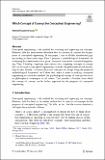Files in this item
Which concept of concept for conceptual engineering?
Item metadata
| dc.contributor.author | Isaac, Manuel | |
| dc.date.accessioned | 2021-09-20T10:30:01Z | |
| dc.date.available | 2021-09-20T10:30:01Z | |
| dc.date.issued | 2021-09-17 | |
| dc.identifier | 275627216 | |
| dc.identifier | 3a8c4fa6-206d-4ad7-a899-861056699702 | |
| dc.identifier | 85115116789 | |
| dc.identifier | 000696784700002 | |
| dc.identifier.citation | Isaac , M 2021 , ' Which concept of concept for conceptual engineering? ' , Erkenntnis , vol. First Online . https://doi.org/10.1007/s10670-021-00447-0 | en |
| dc.identifier.issn | 0165-0106 | |
| dc.identifier.other | ORCID: /0000-0002-5479-5027/work/100549780 | |
| dc.identifier.uri | https://hdl.handle.net/10023/23990 | |
| dc.description | Research for this article was funded by the Swiss National Science Foundation, grant number P400PG_183807. | en |
| dc.description.abstract | Conceptual engineering is the method for assessing and improving our concepts. However, little has been written about how best to conceive of concepts for the purposes of conceptual engineering. In this paper, I aim to fill this foundational gap, proceeding in three main steps: First, I propose a methodological framework for evaluating the conduciveness of a given concept of concept for conceptual engineering. Then, I develop a typology that contrasts two competing concepts of concept that can be used in conceptual engineering—namely, the philosophical and psychological ones. Finally, I evaluate these two concepts of concept using the proposed methodological framework and I show that, when it comes to making conceptual engineering an actionable method, the psychological concept of concept outclasses its philosophical counterpart on all counts. This provides a baseline from which the concept of concept can be further improved for the purposes of conceptual engineering. | |
| dc.format.extent | 25 | |
| dc.format.extent | 754606 | |
| dc.language.iso | eng | |
| dc.relation.ispartof | Erkenntnis | en |
| dc.subject | B Philosophy (General) | en |
| dc.subject | T-NDAS | en |
| dc.subject.lcc | B1 | en |
| dc.title | Which concept of concept for conceptual engineering? | en |
| dc.type | Journal article | en |
| dc.contributor.institution | University of St Andrews. Philosophy | en |
| dc.identifier.doi | 10.1007/s10670-021-00447-0 | |
| dc.description.status | Peer reviewed | en |
This item appears in the following Collection(s)
Items in the St Andrews Research Repository are protected by copyright, with all rights reserved, unless otherwise indicated.

